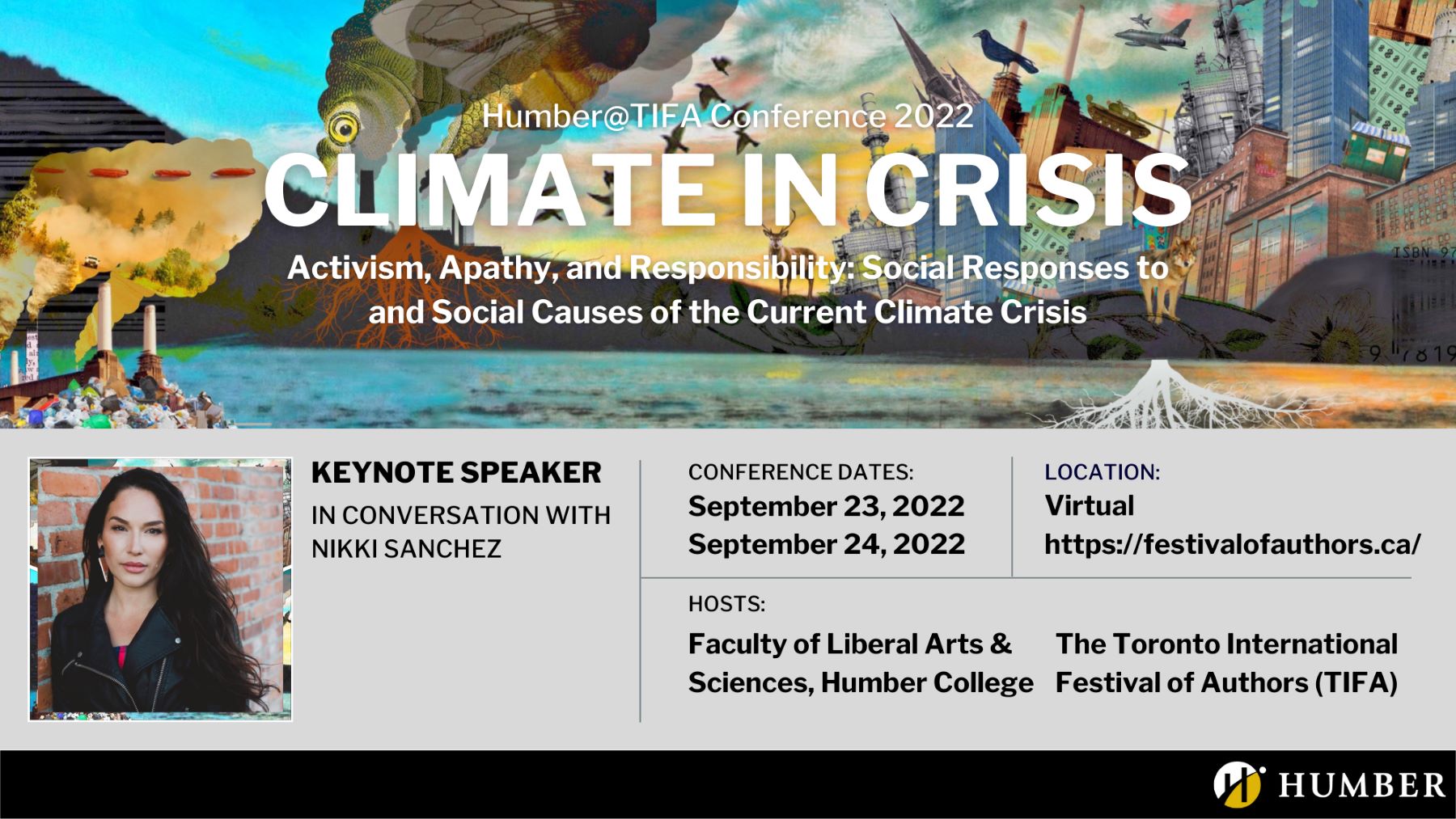We are excited to share details for our eighth annual (and second virtual) Humber@TIFA interdisciplinary conference, “Climate in Crisis Activism, Apathy, and Responsibility: Social Responses to and Social Causes of the Current Climate Crisis.” To find the abstracts and bios for this year’s delegates, please refer to our Humber@TIFA website which will be updated by next week. Our conference will be hosted online by the Toronto International Festival of Authors (TIFA.) .
To register for our conference, you must create a free TIFA account.
We strongly encourage you to ask your friends, colleagues, and students to register as TIFA members so that they too will be able to participate in conference events. If you need any help registering, please consult the FAQ page.
The schedule of the conference recently went live on the festival calendar, and beginning September 1, you will be able to register for individual panels.
Festival Calendar: https://festivalofauthors.ca/calendar
After creating your free membership, you must register for each Humber@TIFA event separately. If you scroll down, you can find our events labeled “Climate in Crisis” with our distinctive conference art by Angela Aujla.
There will be a keynote on Friday, September 23 at 5:30 p.m. with Nikki Sanchez. Nikki Sanchez is a Pipil and Irish/Scottish academic, land defender, media maker, environmental spokesperson, and decolonization expert. You can see more of her work on the VICELAND series RISE or in her TEDx talk "Decolonization is for Everyone." She is an activist, author, and educator, as well as the founder and director of Decolonize Together. The theme of her keynote is on Challenging Climate Grief and Apathy.
There are also four panels on Saturday, September 24 starting at 9 a.m. We encourage you to join us and to ask questions. With such a small virtual conference, your engagement would be greatly appreciated.
9 a.m.: Climate in Crisis: Reading into the Environmental Emergency (film and literature)
This panel explores the stories being told in response to the climate crisis, including analysis of eco-weird stories manifesting the fear and anxieties of climate change. While the discussion will be wide-ranging, it will grapple with questions about whether or not Eco-SF predicts the future or models potential scenarios and how water scarcity could be the driving force of our dystopic future. The discussion will be built around close readings of texts including All Quiet in Vikaspuri, a graphic novel by Sarnath Banarjee, Isaac Asimov’s Foundation series, and the filmography of globally acclaimed, Academy Award-winning director Bong Joon-Ho.
11 a.m.: Climate in Crisis: Pedagogies of Resilience and Hope
This panel will explore various ways in which educational approaches and disciplines are, or should, be responding to the climate crisis. Discussion will move from looking at specific disciplines, including teaching about the need to create sustainable fashion and exploring a framework for teaching Climate Change Education, to broader approaches around how hope and resilience-based education can help to overcome the increasing prevalence of eco-anxiety.
1 p.m: Climate in Crisis: Stories from the Front Lines of the Environmental Crisis
Specific stories from various front lines of the climate crisis are explored in this panel. This includes an analysis of how art can offer a critique of the environmental racism faced by the Sámi in Sápmi, specifically looking at how art created through the application of Artificial Intelligence (AI) systems can go beyond a visual representation of the climate crisis to engage in meaningful debate on the urgency of our climate responsibility. There will also be a presentation on research that engages politically active youth in Mi’kma’ki that sought to identify connections between political activism and climate grief. Finally, the differing views on sustainable architecture will be examined, with a specific analysis of the role of the architect and the choice of sustainable logic become central to the design process of sustainable architecture, with a specific focus on the development of Danish social housing.
3 p.m.: Climate in Crisis: The End of International Experiential Learning?
This panel focuses on the urgent need to rethink global or international experiential learning programs in response to the climate crisis. Canadian university campuses are quickly returning to pre-Covid “normal,” and international programming is again in high demand among students. The research presented in this panel explores a wide range of the responsibilities for institutions and individuals within Canadian higher education at a time of climate crisis.
Thank you for your support!
Humber@TIFA co-chairs
Jennifer Marotta & Dave Miller

